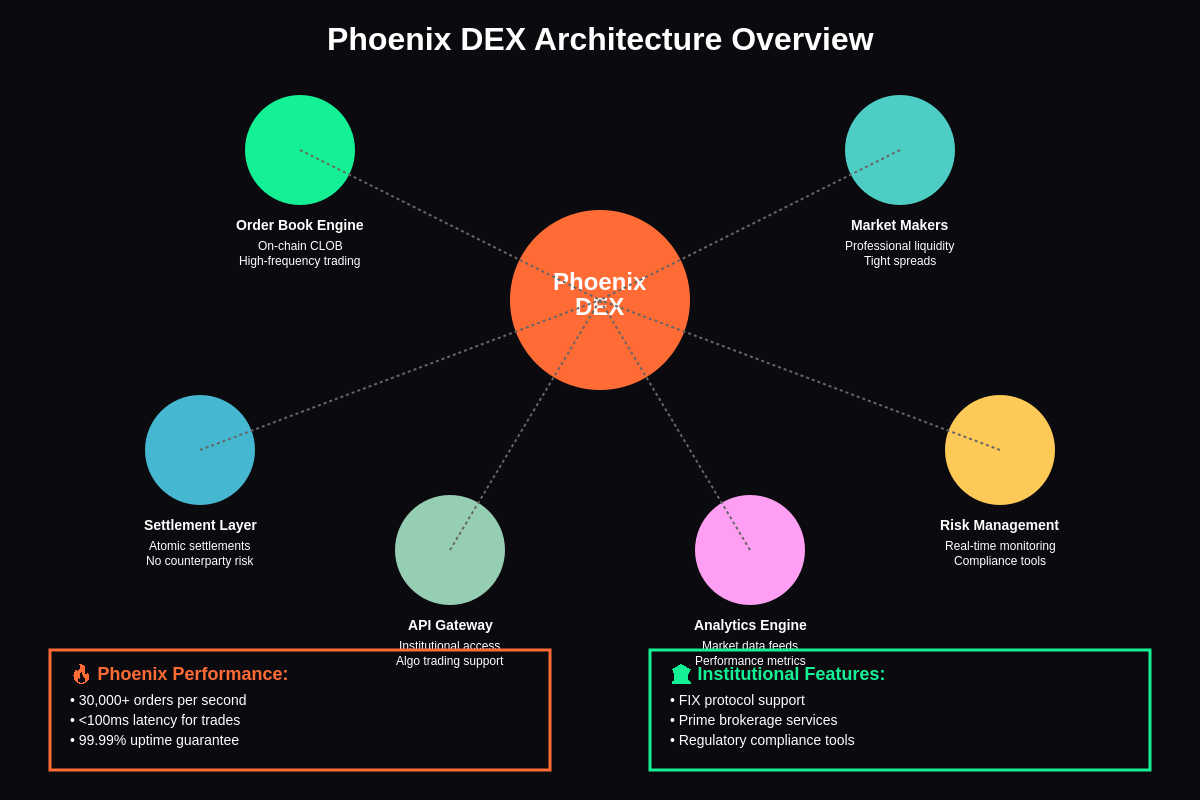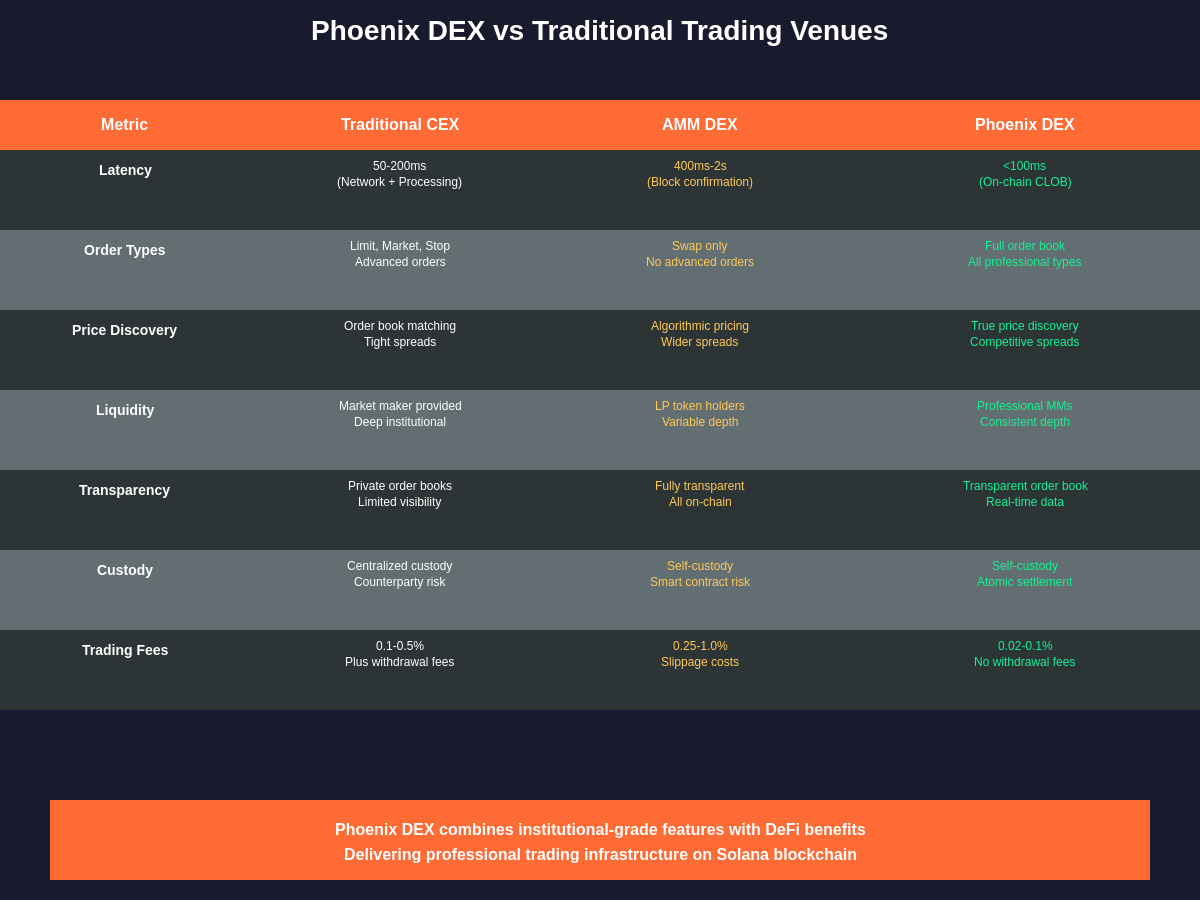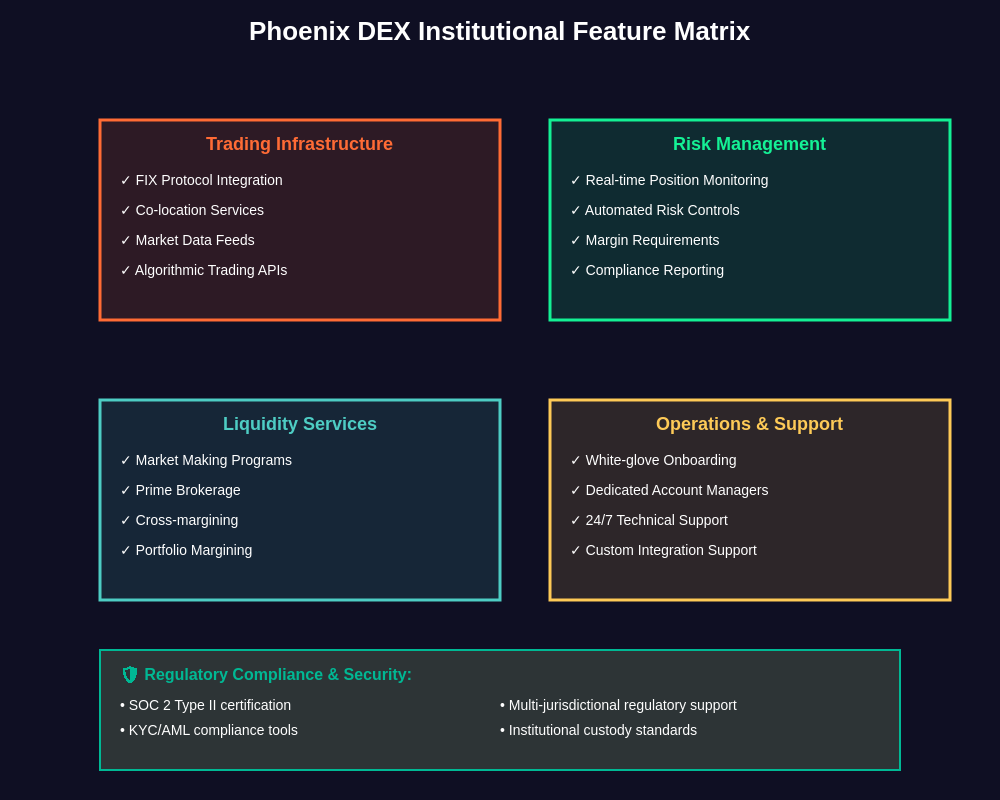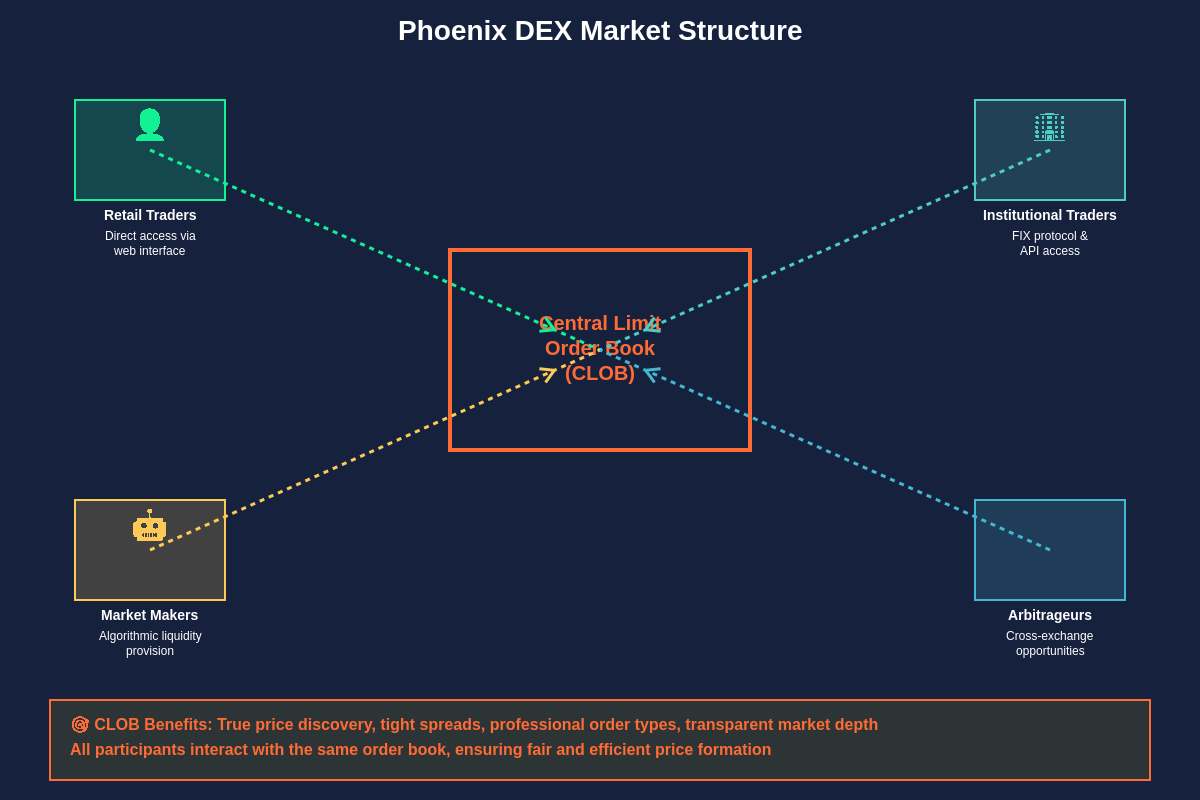Revolutionizing Professional Trading Infrastructure
Phoenix DEX represents a paradigm shift in decentralized exchange architecture, bringing institutional-grade trading infrastructure to the Solana blockchain ecosystem. Unlike traditional automated market makers that rely on algorithmic pricing mechanisms, Phoenix implements a Central Limit Order Book that mirrors the sophisticated trading environments used by professional traders and institutional market participants across global financial markets.

The platform addresses critical limitations that have historically prevented institutional adoption of decentralized exchanges, including inadequate order types, poor price discovery mechanisms, high latency trading environments, and insufficient market depth. By implementing a fully on-chain order book with sub-100 millisecond execution times, Phoenix DEX bridges the gap between the transparency and self-custody benefits of decentralized finance and the professional trading tools required by sophisticated market participants.
Built specifically for Solana’s high-performance blockchain infrastructure, Phoenix leverages the network’s exceptional transaction throughput and low fees to create a trading environment that not only matches but often exceeds the performance characteristics of traditional centralized exchanges. The platform’s architecture enables professional features including advanced order types, algorithmic trading capabilities, institutional-grade risk management tools, and compliance features that meet the requirements of regulated financial institutions.
Advanced Order Book Architecture
The foundation of Phoenix DEX’s institutional appeal lies in its sophisticated Central Limit Order Book implementation, which operates entirely on-chain while maintaining the performance characteristics that professional traders demand. This architecture represents a significant technological achievement in blockchain-based trading systems, as it combines the transparency and trustlessness of decentralized systems with the speed and functionality of traditional exchange infrastructure.
The order book engine processes over 30,000 orders per second with sub-100 millisecond latency, performance metrics that rival and often exceed those of established centralized exchanges. This exceptional performance is achieved through optimized smart contract architecture that takes full advantage of Solana’s parallel processing capabilities and low-cost transaction environment. Unlike Ethereum-based decentralized exchanges that suffer from network congestion and high gas fees, Phoenix operates in an environment where traders can submit and modify orders continuously without prohibitive costs.
Professional traders benefit from a complete suite of order types including limit orders, market orders, stop-loss orders, take-profit orders, and sophisticated conditional orders that can be programmed with complex execution logic. The platform supports advanced trading strategies such as iceberg orders that hide large position sizes, time-in-force specifications that control order duration, and fill-or-kill orders that ensure complete execution or automatic cancellation.
Market makers receive particular attention in Phoenix’s design, with specialized tools that enable continuous liquidity provision through algorithmic trading strategies. The platform provides direct API access that supports high-frequency trading operations, co-location services that minimize network latency, and rebate structures that incentivize professional liquidity provision. These features attract professional market making firms that bring deep liquidity and tight spreads to the platform’s trading pairs.
Institutional Trading Features and Compliance
Phoenix DEX addresses the complex requirements of institutional trading through comprehensive feature sets that meet the operational, risk management, and regulatory compliance needs of professional financial institutions. The platform implements FIX protocol support, enabling seamless integration with existing institutional trading infrastructure and order management systems used by hedge funds, asset managers, and proprietary trading firms.

Risk management capabilities include real-time position monitoring, automated risk controls that can halt trading based on predefined parameters, margin requirements that are calculated dynamically based on market conditions, and comprehensive compliance reporting tools that generate the documentation required for regulatory oversight. These features are essential for institutional participants who must maintain strict risk controls and demonstrate compliance with financial regulations across multiple jurisdictions.
The platform’s prime brokerage services enable institutional clients to consolidate their trading operations while maintaining direct control over their assets through self-custody arrangements. This hybrid approach addresses one of the primary concerns of institutional investors who require professional trading services but are unwilling to accept the counterparty risks associated with traditional centralized custody solutions.
White-glove onboarding services ensure that institutional clients receive personalized support during their integration process, with dedicated account managers who understand the complex requirements of professional trading operations. Technical support operates on a 24/7 basis with priority response times for institutional clients, ensuring that trading operations can continue uninterrupted across global time zones.
Technology Infrastructure and Performance
The technological foundation of Phoenix DEX is built upon Solana’s exceptional blockchain infrastructure, which provides the speed, cost efficiency, and scalability required for professional trading operations. The platform’s smart contracts are optimized for maximum performance, utilizing advanced programming techniques that minimize computational overhead while maintaining the security and reliability required for high-value financial transactions.
Atomic settlement capabilities ensure that trades execute instantaneously without counterparty risk, as the blockchain automatically handles the simultaneous exchange of assets between trading parties. This eliminates the settlement delays and counterparty risks associated with traditional exchange infrastructure, while providing the speed and reliability that professional traders require for their strategies.
The platform maintains direct connections to multiple Solana RPC nodes to ensure redundancy and minimize the impact of network congestion on trading operations. Load balancing algorithms distribute trading activity across available infrastructure to optimize performance during high-volume trading periods, while comprehensive monitoring systems provide real-time visibility into system performance and automatically alert technical teams to potential issues before they impact trading operations.
Market data feeds provide institutional clients with real-time access to order book depth, trade history, and market statistics through both REST APIs and WebSocket connections that support streaming data applications. These feeds support the algorithmic trading systems and quantitative analysis tools that institutional clients rely upon for their trading strategies.
Market Structure and Liquidity Provision
Phoenix DEX implements a market structure designed to attract and retain professional liquidity providers while ensuring fair and efficient price discovery for all market participants. The Central Limit Order Book enables true price discovery through the interaction of supply and demand, as opposed to the algorithmic pricing mechanisms used by automated market makers that can result in significant price inefficiencies during volatile market conditions.
Professional market makers receive economic incentives through maker rebate programs that reward liquidity provision, while takers pay fees that support the platform’s operations and incentive structures. This fee structure mirrors those used by successful traditional exchanges and creates economic incentives that encourage continuous liquidity provision across all trading pairs.
The platform’s matching engine implements price-time priority, ensuring that orders are executed fairly based on price improvement and time of submission. This transparent and predictable execution model builds confidence among professional traders who require certainty about how their orders will be handled in various market conditions.
Cross-margining capabilities allow institutional clients to offset positions across different trading pairs, reducing capital requirements and enabling more sophisticated trading strategies. Portfolio margining takes this concept further by calculating margin requirements based on the overall risk profile of a client’s entire portfolio rather than individual positions, significantly improving capital efficiency for large trading operations.
Integration with Solana DeFi Ecosystem
Phoenix DEX benefits from deep integration with Solana’s broader decentralized finance ecosystem, providing traders with access to yield farming opportunities, lending protocols, and other DeFi services that can enhance trading strategies and improve capital efficiency. These integrations are facilitated through standardized protocols that enable seamless interaction between different DeFi applications while maintaining the security and reliability required for professional trading operations.
Yield farming strategies can be implemented directly through TradingView’s comprehensive charting tools, allowing traders to analyze potential returns and risks before committing capital to specific farming opportunities. The platform’s integration with lending protocols enables traders to access leverage for their positions while maintaining self-custody of their assets, avoiding the counterparty risks associated with centralized lending arrangements.
Cross-protocol arbitrage opportunities arise naturally from Phoenix’s position within the Solana ecosystem, as price discrepancies between different exchanges and AMMs can be exploited through sophisticated trading strategies. Professional arbitrageurs benefit from the platform’s low transaction costs and fast execution times, which enable profitable arbitrage even on small price discrepancies that would be unprofitable on higher-cost blockchain networks.
The platform supports direct integration with popular Solana wallets including Phantom, Solflare, and Ledger hardware wallets, ensuring that users can maintain control over their private keys while accessing professional trading features. Multi-signature wallet support enables institutional clients to implement their internal approval processes for large trades while maintaining the security benefits of distributed key management.
Advanced Trading Tools and Analytics
Professional traders require sophisticated analytical tools to make informed trading decisions, and Phoenix DEX provides comprehensive charting capabilities, technical analysis indicators, and market data visualization tools that meet these requirements. The platform integrates with TradingView’s professional charting platform, providing access to hundreds of technical indicators and drawing tools that enable detailed market analysis.
Real-time market depth visualization allows traders to assess liquidity conditions and identify optimal entry and exit points for their positions. Order book heat maps provide visual representations of support and resistance levels based on actual order flow, while trade history analysis enables traders to identify patterns and trends that may influence future price movements.
Algorithmic trading capabilities are supported through comprehensive APIs that enable automated trading strategies to be implemented and executed directly on the platform. These APIs support both REST and WebSocket protocols, enabling real-time data access and order execution for high-frequency trading strategies. Rate limiting and authentication mechanisms ensure that API access remains reliable and secure even during high-volume trading periods.
Portfolio analysis tools provide institutional clients with comprehensive reporting capabilities that track performance across multiple trading pairs and time periods. These reports can be customized to meet specific regulatory reporting requirements and internal risk management policies, ensuring that institutional clients can maintain proper oversight of their trading activities.
Regulatory Compliance and Security Framework
Phoenix DEX implements comprehensive security and compliance frameworks designed to meet the requirements of regulated financial institutions while maintaining the decentralized and trustless characteristics that define DeFi protocols. The platform undergoes regular security audits by leading blockchain security firms, with audit reports published transparently to enable independent verification of the platform’s security measures.
KYC and AML compliance tools are available for institutional clients who require identity verification and transaction monitoring capabilities to meet regulatory requirements in their respective jurisdictions. These tools can be implemented selectively, allowing individual institutions to apply appropriate compliance measures without compromising the privacy and accessibility of the platform for other users.
SOC 2 Type II certification demonstrates the platform’s commitment to maintaining institutional-grade operational security standards, while regular penetration testing ensures that security vulnerabilities are identified and addressed before they can be exploited by malicious actors. Multi-signature governance mechanisms require consensus among multiple parties before critical platform updates can be implemented, providing additional security against unauthorized changes.
Insurance coverage protects against smart contract vulnerabilities and operational risks, providing institutional clients with additional confidence in the platform’s reliability and security. Coverage limits and terms are structured to meet the requirements of large institutional clients while maintaining cost-effective premiums that do not significantly impact the platform’s operational economics.
Market Making and Professional Services
Phoenix DEX provides specialized services and support for professional market makers who provide liquidity to the platform’s trading pairs. Market making programs offer reduced fees, rebate structures, and direct technical support to ensure that professional liquidity providers can operate efficiently and profitably within the platform’s ecosystem.

Co-location services minimize network latency for market makers who require the fastest possible order execution times to maintain competitive spreads and react quickly to market movements. These services include direct network connections to the platform’s infrastructure and priority queue access that ensures market maker orders receive preferential treatment during high-volume trading periods.
Dedicated account managers provide personalized support for large market making operations, helping to optimize trading strategies, resolve technical issues, and coordinate platform updates that may impact trading operations. Regular communication ensures that market makers receive advance notice of platform changes and can adjust their strategies accordingly.
Risk management tools specifically designed for market making operations include position limits, maximum drawdown controls, and automated circuit breakers that can halt trading if predefined risk thresholds are exceeded. These tools help market makers maintain appropriate risk controls while enabling them to provide continuous liquidity across multiple trading pairs.
Future Development and Platform Evolution
The Phoenix DEX development roadmap includes several significant enhancements designed to further strengthen the platform’s position as the premier institutional trading venue within the Solana ecosystem. Cross-chain bridge integrations will enable trading of assets from other blockchain networks, significantly expanding the universe of tradeable assets while maintaining the performance advantages of Solana-based settlement.
Derivatives trading capabilities including futures, options, and perpetual contracts are under development, providing institutional clients with sophisticated risk management and speculative trading tools that are currently unavailable on most decentralized exchanges. These products will be backed by robust margin systems and risk management frameworks that meet institutional requirements for derivatives trading.
Enhanced API capabilities will provide even more granular control over trading operations, with support for custom order types, advanced conditional logic, and direct integration with popular institutional order management systems. WebSocket feeds will be expanded to provide more detailed market data including level-2 order book data and trade-by-trade execution information.
Governance mechanisms will be implemented to enable community participation in platform development decisions while maintaining the operational efficiency required for professional trading operations. Token holder voting on key platform parameters and development priorities will ensure that the platform continues to evolve in response to user needs and market conditions.
Economic Model and Sustainability
Phoenix DEX implements a sustainable economic model that aligns the interests of all platform participants while generating sufficient revenue to support ongoing development and operations. Trading fees are structured competitively relative to traditional exchanges while providing economic incentives for liquidity providers through maker rebate programs that reward continuous market making activity.

Revenue sharing mechanisms distribute a portion of platform fees to token holders and governance participants, creating long-term incentive alignment between the platform’s success and the interests of its community. These mechanisms are designed to ensure sustainable growth while avoiding the unsustainable token emission models that have proven problematic for many DeFi protocols.
Partnership programs with institutional clients provide additional revenue streams through custom development work, premium support services, and specialized infrastructure arrangements. These partnerships also drive platform development by ensuring that new features meet the actual needs of professional trading organizations.
Market development initiatives including trading competitions, volume incentives, and educational programs help attract new users and increase overall platform activity. These programs are funded through platform revenues and are designed to create sustainable growth rather than short-term activity spikes that do not contribute to long-term platform health.
Conclusion: The Future of Institutional DeFi Trading
Phoenix DEX represents the maturation of decentralized exchange technology to the point where it can effectively serve the needs of sophisticated institutional trading organizations while maintaining the core benefits of decentralized finance. By combining institutional-grade trading infrastructure with the transparency, self-custody, and global accessibility of blockchain technology, Phoenix creates a new paradigm for professional cryptocurrency trading.
The platform’s success demonstrates that decentralized exchanges can achieve the performance, reliability, and feature completeness required by professional traders without sacrificing the fundamental advantages that make DeFi compelling. As traditional financial institutions continue to explore cryptocurrency trading and blockchain-based financial services, platforms like Phoenix DEX will play an increasingly important role in bridging the gap between traditional finance and decentralized systems.
The combination of Solana’s exceptional blockchain infrastructure with Phoenix’s sophisticated trading technology creates an environment where institutional clients can access the benefits of decentralized finance while maintaining the professional trading capabilities they require. This represents a significant step forward in the evolution of cryptocurrency trading infrastructure and positions Phoenix DEX as a leader in the next generation of financial market infrastructure.
For traders seeking professional-grade market analysis tools, Phoenix DEX’s integration with leading analytical platforms ensures that users have access to the comprehensive data and tools they need to make informed trading decisions in today’s complex cryptocurrency markets.
Disclaimer: This article is for informational purposes only and does not constitute financial advice. Cryptocurrency trading involves significant risks, including the potential loss of capital. Past performance does not guarantee future results. Always conduct thorough research and consider consulting with qualified financial advisors before making investment decisions. The information presented here may not be suitable for all investors and should not be relied upon as the sole basis for investment decisions.